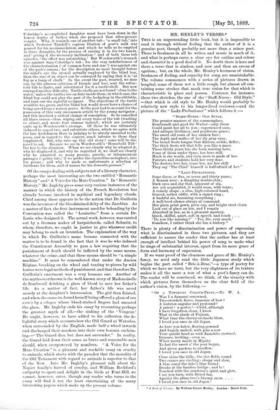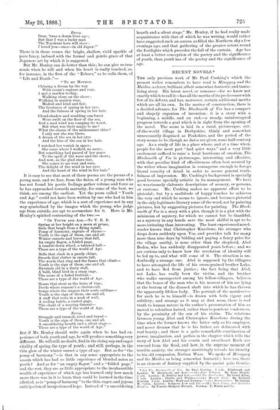MR. HENLEY'S VERSES.* THIS is an unpretending little book, but
it is impossible to read it through without feeling that the author of it is a genuine poet, though probably not more than a minor poet. There is freshness in all he writes, and music in much of it, and what is perhaps rarer, a clear eye for outline and colour and character in a good deal of it. No doubt there is here and there a verse that is aimless, and now and then an excess of egotism ; but, on the whole, Mr. Henley's keenness of vision, freshness of feeling, and capacity for song, are unmistakable. The volume commences with a series of pictures drawn in hospital, some of them not a little rough, but almost all con- taining some strokes that mark true vision for that which is characteristic in place and person. Contrast, for instance, these two sketches, the one of the " Staff-Nurse : Old Style," —that which is old style to Mr. Henley would probably be relatively new style to his longer-lived reviewer,—and the picture of the " Lady-Probationer " which follows it :—
STAFF-N1SESE : OLD STYLE.
The greater masters of the commonplace, Rembrandt and good Sir Walter—only these Could paint her all to you : experienced ease, And antique liveliness, and ponderous grace; The sweet old roses of her sunken face; The depth and malice of her sly gray eyes ; The broad Scots tongue that flatters, scolds, defies ; The thick Scots wit that fells you like a mace.
These thirty years has she been nursing here, Some of them under Syme, her hero still.
Much is she worth, and even more is made of her.
Patients and students hold her very dear.
The doctors love her, tease her, use her skill.
They say The Chief' himself is half-afraid of her."
" LADY-PROBATIONER.
Some three, or five, or seven and thirty years ;
A Roman nose; a dimpling double-chin ; Dark eyes and shy that, ignorant of sin, Are yet acquainted, it would seem, with tears; A comely shape ; a slim, high-coloured hand, Graced, rather oddly, with a signet ring ; A bashful air, becoming everything ; A well-bred silence always at command.
Her plain print gown, prim cap, and bright steel chain Look out of place on her, and I remain Absorbed in her, as in a pleasant mystery.
Quick, skilful, quiet, soft in speech and touch . . .
'Do you like nursing ?" Yes, Sir, very much.'
Somehow, I rather think she has a history."
There is plenty of discrimination and power of expressing what is discriminated in these two pictures, and they are sufficient to assure the reader that the author has at least enough of intellect 'behind his power of song to make what he sings of substantial interest, apart from its mere grace of form and harmony of expression.
If we want proof of the clearness and grace of Mr. Henley's fancy, we need only read the little Japanese study which begins the part called " Bric-h-Brac,"—a type of poetry for which we have no taste, but the very slightness of its texture makes it all the more a test of what a poet's fancy can do. The reader will be convinced, we think, of the vivacity with which pictures form themselves on the clear field of the author's vision, by the following
OF A TOYORIINI COLOUR-PRINT.—TO W. A.
Was I a Samurai renowned, Two-sworded, fierce, immense of bow ?
A histrion angular and profound ?
A priest ? a porter ?—Child, although I have forgotten clean, I know That in the shade of Fujisan, What time the cherry-orchards blow,
I loved you once in old Japan.
As here you loiter, flowing-gowned And hugely sashed, with pins a-row Your quaint head as with flamelets crowned, Demure, inviting—even so,
When merry maids in Miyake To feel the sweet o' the year began,
And green gardens to overflow, I loved you once in old Japan.
Clear shine the hills ; the rice fields round Two cranes are circling ; sleepy and slow, A blue canal the lake's blue bound Breaks at the bamboo bridge ; and lo !
Touched with the sundown's spirit and glow, I see you turn, with flirted fan, Against the plum-tree's bloomy snow. . . . I loved you once in old Japan !
• A Book of Verses. By william Ernest Henley. London : David Nat.
Envoy.
Dear, 'twas a dozen lives ago ; But that I was a lucky man The Toyokuni here will show : I loved you—once—in old Japan !"
There is in these verses the bright, shallow, vivid sparkle of pure fancy, imbued with the formal and gentle grace of that
Japanese art by which it is suggested.
But Mr. Henley can do better than this ; he can give us true music when he will and when his heart is really touched, as,
for instance, in the first of the "Echoes," as he calls them, of " Life and Death :"—
" To MY MOTHER.
Chiming a dream by the way With ocean's rapture and roar,
I met a maiden to-day, Walking alone on the shore : Walking in maiden wise, Modest and kind and fair, The freshness of spring in her eyes And the fulness of spring in her hair.
Cloud-shadow and scudding sun-burst Were swift on the floor of the sea, And a mad wind was romping its worst, But what was their magic to me ?
What the charm of the midsummer skies ?
I only saw she was there, A dream of the sea in her eyes And the kiss of the sea in her hair.
I watched her vanish in space ;
She came where I walked, no more ; But something had passed of her grace To the spell of the wave and the shore; And now, as the glad stars rise, She comes to me rosy and rare, The delight of the wind in her eyes And the hand of the wind in her hair."
It is easy to see that most of these poems are the poems of a young man, and we fear, from the dates, of a young man who has not found his poetic feelings gather volume and force as he has approached towards maturity, for some of the best, we think, are among the earliest. Yet the poem called " Youth and Age" could not have been written by one who had in him the experience of age, which is a sort of experience not in any way symbolised by the images which the young, who judge age from outside, are apt to accumulate for it. Here is Mr. Henley's spirited contrasting of the two :- " OF You= AND AGE.—To T. E. B. Spring at her height on a morn at prime, Sails that laugh from a flying squall, Pomp of harmony, rapture of rhyme— Youth is the sign of them, one and all. Winter sunsets and leaves that fall, An empty flagon, a folded page,
A tumble-down wheel, a tattered ball— These are a type of the world of Age.
Bells that clash in a gaudy chime, Swords that clatter in onsets tall,
The words that ring and the fames that climb—
Youth is the sign of them, one and all.
Hymnals old in a dusty stall, A bald, blind bird in a crazy cage,
The scene of a faded festival—
These are a type of the world of Age.
Hours that strut as the heirs of time, Deeds whose rumour's a clarion-call,
Songs where the singers their souls sublime—
Youth is the sign of them, one and all. A staff that rests in a nook of wall, A reeling battle, a rusted gage,
The chant of a nearing funeral—
These are a type of the world of Age.
Envoy.
Struggle and turmoil, revel and brawl— Youth is the sign of them, one and all. A smouldering hearth and a silent stage— These are a type of the world of Age."
But if Mr. Henley should write again when he has had ex- perience of both youth and age, he will produce something very different. He will still, no doubt, find in the rising sap and eager vitality of spring the type of youth ; and still, perhaps, in the thin glow of the winter sunset a type of age. But as for " the pomp of harmony,"—is that in any sense appropriate to the season which has had so little experience of blended notes as youth ? And as for "an empty flagon" and a "folded page," and the rest, they are as little appropriate to the inexhaustible wealth of experience of which age has learned only how much more there was in it to learn than could be learned in the time allotted, as is " pomp of harmony " to the thin, eager, and joyous anticipation of inexperienced hope. Instead of "a smouldering
hearth and a silent stage," Mr. Henley, if he had really made acquaintance with that of which he was writing, would rather have suggested such an aurora as filled the Northern sky a few evenings ago, and that gathering of the greater actors round the footlights which precedes the fall of the curtain. Age has at least a better conception of the poetry and the significance of youth, than youth has of the poetry and the significance of age.



































 Previous page
Previous page